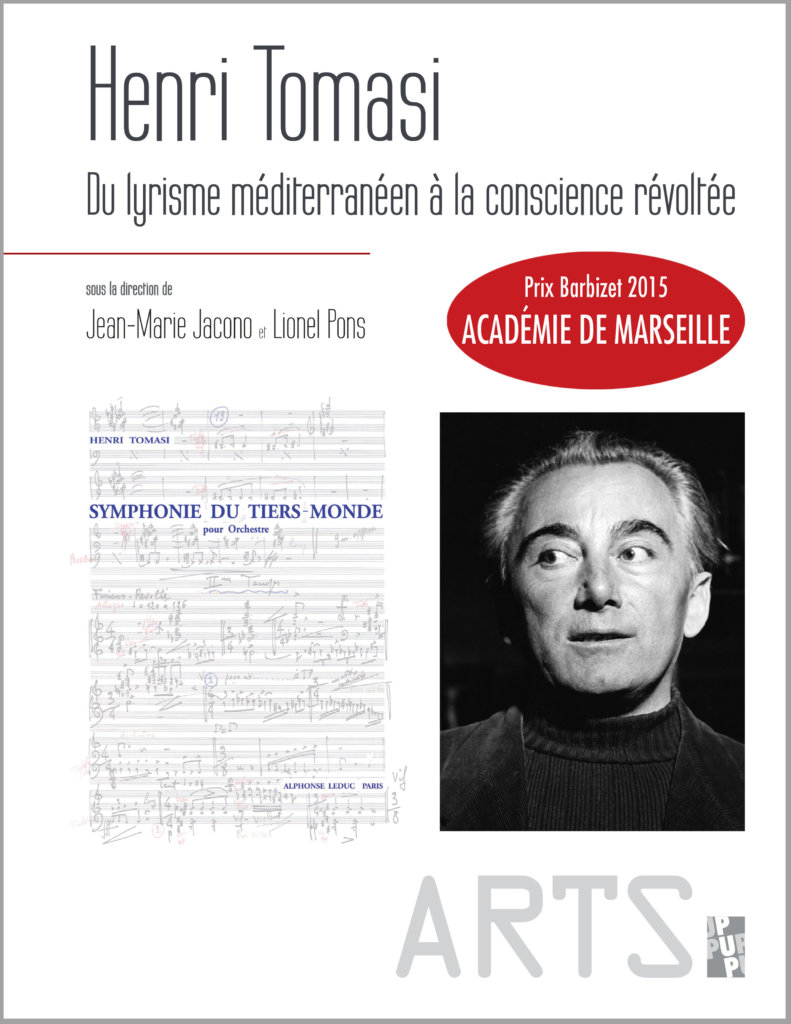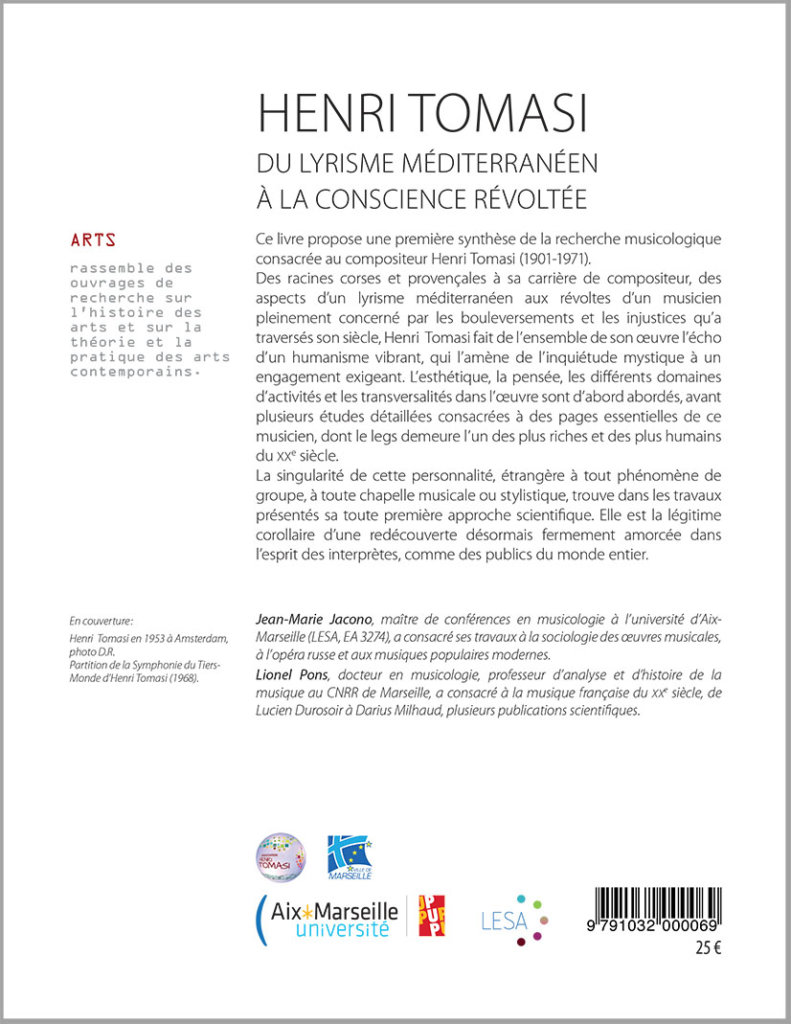

| Table des matières | ||
| Avant-propos | ||
| Jean-Marie Jacono & Lionel Pons…………………………………………………………………………………….. | 5 | |
| Esthétique, style, langage | ||
| Henri Tomasi : images et imaginaires | ||
| Danièle Pistone…………………………………………………………………………………………………………. | 13 | |
| Henri Tomasi : Être ou ne pas être moderne | ||
| Michel Duchesneau…………………………………………………………………………………………………….. | 23 | |
| Quelques observations sur le langage musical et la dramaturgie d’Henri Tomasi dans Miguel Mañara, Sampiero Corso et Le Silence de la mer | ||
| Jean-Pierre Bartoli………………………………………………………………………………………………………. | 35 | |
| L’univers musical d’Henri Tomasi | ||
| Philippe Malhaire………………………………………………………………………………………………………… | 59 | |
| Les figures mélodiques dans la musique symphonique d’Henri Tomasi | ||
| Étienne Kippelen……………………………………………………………………………………………………….. | 71 | |
| Le langage de Tomasi | ||
| Jacques Amblard……………………………………………………………………………………………………….. | 85 | |
| L’homme, la vie | ||
| « Mare Nostrum » : ombre et lumière dans la vie et l’œuvre d’Henri Tomasi | ||
| Michel Solis │Claude Tomasi………………………………………………………………………………………….. | 101 | |
| Témoignage : « On ne voit bien qu’avec le cœur » | ||
| Serge Baudo……………………………………………………………………………………………………………. | 119 | |
| Un musicien dans la tourmente de la Seconde Guerre mondiale | ||
| Frédéric Ducros Malmazet…………………………………………………………………………………………….. | 121 | |
| Domaines d’activité et transversalités dans l’œuvre | ||
| Henri Tomasi et la radio | ||
| Christophe Bennet…………………………………………………………………………………………………….. | 141 | |
| Henri Tomasi et le cinéma : une stimulation féconde | ||
| Jérôme Rossi……………………………………………………………………………………………………………. | 157 | |
| Du timbre à la technique instrumentale | ||
| Xavier Canin……………………………………………………………………………………………………………… | 179 | |
| De quelques mélodies d’Henri Tomasi | ||
| Michel Faure…………………………………………………………………………………………………………….. | 195 | |
| Le piano dans l’œuvre d’Henri Tomasi | ||
| Ana Telles……………………………………………………………………………………………………………….. | 209 | |
| Racines méditerranéennes et lyrisme apollinien | ||
| « L’exotisme provençal » dans l’œuvre d’Henri Tomasi | ||
| Sylvain Brétéché……………………………………………………………………………………………………….. | 239 | |
| Typologies musicales à l’œuvre dans les Lettres de mon moulin (1954) de Marcel Pagnol | ||
| Dominique Escande……………………………………………………………………………………………………. | 259 | |
| Citations et parodies du populaire dans l’œuvre musicale | ||
| Éric Montbel…………………………………………………………………………………………………………….. | 271 | |
| Le chant corse et ses influences dans l’esthétique d’Henri Tomasi à travers l’opéra Sampiero Corso | ||
| Emmanuelle Mariini……………………………………………………………………………………………………… | 287 | |
| L’influence de la Corse dans l’œuvre d’Henri Tomasi | ||
| Frédéric Ducros Malmazet…………………………………………………………………………………………….. | 297 | |
| « Une musique qui vient du cœur »… | ||
| Fabien San Martin………………………………………………………………………………………………………. | 323 | |
| Pensées, images, mélodies… sous la lumière des Cyclades ! | ||
| Kalliopi Stiga…………………………………………………………………………………………………………….. | 339 | |
| La dimension spirituelle | ||
| Don Juan de Mañara : la rédemption, figure emblématique de l’opéra francophone dans l’après-guerre | ||
| Cécile Auzolle……………………………………………………………………………………………………………. | 365 | |
| Henri Tomasi, compositeur existentiel | ||
| Eero Tarasti……………………………………………………………………………………………………………… | 377 | |
| Le Requiem pour la paix, un parcours musical et existentiel | ||
| Guillaume Gratia………………………………………………………………………………………………………… | 385 | |
| L’humanisme et la révolte en œuvres | ||
| Le Silence de la mer : un drame lyrique d’après Vercors | ||
| Cécile Quesney…………………………………………………………………………………………………………. | 405 | |
| Le Concerto de guitare de Tomasi et la mémoire du poète assassiné | ||
| Salim Dada………………………………………………………………………………………………………………. | 417 | |
| Ulysse ou le beau périple d’Henri Tomasi (1961-1964) | ||
| Lionel Pons………………………………………………………………………………………………………………. | 443 | |
| La Symphonie du Tiers-Monde, image cinématographique et montage musical | ||
| Jean Paul Olive & Álvaro Oviedo……………………………………………………………………………………… | 471 | |
| De Tomasi à Pécou : symphonie du Tiers-Monde, symphonie du Tout-Monde | ||
| Nicolas Darbon………………………………………………………………………………………………………….. | 485 | |
| Les timbres-ambiances dans Retour à Tipasa d’Albert Camus et Henri Tomasi | ||
| Fethi Salah………………………………………………………………………………………………………………. | 507 | |
| Retour à Tipasa : la Méditerranée d’Albert Camus et Henri Tomasi | ||
| Ana Telles……………………………………………………………………………………………………………….. | 519 | |
| Index des œuvres d’Henri Tomasi……………………………………………………………………………….. | 547 | |
| Index des œuvres musicales d’autres compositeurs………………………………………………………… | 553 | |
Foreword
This book is the first musicological work devoted to the composer Henri Tomasi (1901-1971). It puts an end to an unusual situation. While some of his pages are now performed all over the world, the immense work of this musician has resulted so far only in rare articles, unpublished academic memoirs and a single biography, Written under pseudonym by his son Claude in 2008. The international symposium organized in 2013 by the Laboratory of Studies in Arts Sciences (LESA, University of Aix-Marseille), in collaboration with the French Music Observatory (OMF) of the Paris-Sorbonne University and the Henri Tomasi Association, allowed to highlight the singular and transversal production of a composer who has approached all musical genres and worked for cinema and radio. Organized in Marseille, hometown of Henri Tomasi, then in Ajaccio, this symposium brought together about thirty researchers from France, but also from Algeria, Belgium, Canada, Finland, Greece, Luxembourg and Portugal. This book brings together their communications. It sheds light on Tomasi’s place in French music of the twentieth century, but also to highlight the modernity of his work and his commitments. More
“Henri Tomasi, from Mediterranean lyricism to rebellious conscience”, such is the title of the book directed by Jean-Marie Jacono, lecturer in musicology at the University of Aix Marseille, and Lionel Pons, Ph.D. musicology, professor of analysis and history of music at the Conservatoire de Marseille.
This 550-page book, published in 2015 at Presses Universitaires de Provence, is the fruit of the international symposium organized in 2013 by the University of Aix-Marseille’s Studies in Arts Sciences Laboratory, in collaboration with the French Musical Observatory (Paris Sorbonne University) and the Henri Tomasi Association.
This symposium was held at the Alcazar in Marseille, birthplace of the composer, as well as in Ajaccio, because of its Corsican roots.
Here is an injustice repaired because Henri Tomasi (born in 1901 – died in 1971) remains one of the poorly known musicians of the twentieth century. While some of his plays are performed all over the world, the composer’s important work has not been studied extensively. Only a biography written under the pseudonym of Michel Solis by his son Claude, whose I welcome here, allowed us to approach it.
It is very difficult to summarize in a few words the colossal sum of these musicological researches. All the aspects of the composer, Mediterranean in the soul, as much as his complex personality are approached: his style, his musical language and dramaturgy, his exoticism, the influence of Corsica, of course, but also of Provence, his spiritual or even mystical dimension, his humanist commitment, his revolt against the injustices of his time. We discover with astonishment the tortuous path traveled, since his debut on the piano, accompanying the silent films to the cinema the Fémina, until his brilliant career of conductor, his active participation in the concerts diffused radio he directs, or else his film music … So many transversalities that lead us progressively to apprehend this personality “singular, demanding, alien to any phenomenon of group, any musical chapel” to use the terms of the authors.
Also, the Academy of Sciences, Arts and Letters of Marseille has chosen to award the Pierre Barbizet Prize to MM Jean-Marie Jacono and Lionel Pons for this remarkable synthesis that they co-directed, the reference now on Henri Tomasi.
Jean-Robert Caïn
Académicien élu en 2001 au fauteuil 38
Secrétaire-adjoint de l’Académie
Médecin psychiatre
Membre de la Commission diocésaine d’Art sacré depuis 1985
Titulaire des orgues de Saint-Vincent de Paul–Les Réformés depuis 1995
Directeur du Festival international d’orgue de Roquevaire depuis 1997
Responsable du Bureau des orgues de la Ville de Marseille depuis 2002
